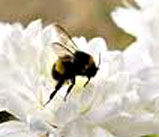In which I discuss the origin and medicinal usefulness of Bee Propolis, it being anti-fungal, anti-bacterial, anti-inflammatory, emollient and cicatrizant.
Back in September, I reported on our trip to Audley End in Essex for Boy the Elder’s 13th birthday. One of the groups of people we encountered was The Essex Beekeeping Association. I think Beekeeping is a practically magical pastime that has so many positive association; nature, honey, waggle-dances*, the inexplicable ability to fly and their vital role in the ecological balance of Earth.
For humans the medicinal effects of propolis are most efficacious and it is available directly from beekeepers and from health food shops in various preparations including raw propolis, creams, lozenges and tinctures.
Propolis is routinely used for the relief of various conditions, including inflammation, viral diseases, ulcers and superficial burns or scalds. It is also believed to promote heart health, strengthen the immune system and reduce the chances of cataracts.
Old beekeepers recommend a piece of propolis kept in the mouth as a remedy for a sore throat and I can attest to the value of this. Put a small lump of propolis into your mouth and press it firmly into one of your back teeth. Allow the propolis to dissolve slowly throughout the day or overnight and the soreness or phlegm is significantly reduced or gone completely.
Claims have been made for its use in treating allergies but propolis may cause severe allergic reactions if the user is sensitive to bees or bee products. As always, I would never recommend treatment for this kind of condition without consulting an accredited Naturopathic practitioner.
Propolis has also been the subject of recent dentistry research, since there is some evidence that it may actively protect against caries and other forms of oral disease, due to its antimicrobial properties.
There are also clinical investigations being undertaken in Japan for the use of propolis as an anti-tumour agent as it would appear that propolis may induce cell cycle arrest and have an anti-proliferation effect on C6 glioma cells.
But what exactly is Propolis?
 Propolis is a mixture of various amounts of beeswax and resins collected by the honeybee from plants, especially from flowers and leaf buds. Bees have been observed scraping the protective resins of flower and leaf buds with their mandibles and then carrying them to the hive like pollen pellets on their hind legs. It is assumed that at some point during the collection and transport of these resins, they are mixed with saliva and other secretions of the bees as well as with wax.
Propolis is a mixture of various amounts of beeswax and resins collected by the honeybee from plants, especially from flowers and leaf buds. Bees have been observed scraping the protective resins of flower and leaf buds with their mandibles and then carrying them to the hive like pollen pellets on their hind legs. It is assumed that at some point during the collection and transport of these resins, they are mixed with saliva and other secretions of the bees as well as with wax.
 The resins are then used by worker bees to reinforce the structural stability of the hive. It lines the inside of nest cavities and breeding combs, and is also used to repair combs, seal small cracks in the hive, reduce the size of hive entrance and to mix small quantities of propolis with wax to seal brood cells. These functions also have the associated advantage that the antibacterial and antifungal effects of propolis seem to protect the colony against diseases. It also reduces vibration and can be used to seal off any waste matter that is too big to remove from the hive and might otherwise putrefy and cause disease.
The resins are then used by worker bees to reinforce the structural stability of the hive. It lines the inside of nest cavities and breeding combs, and is also used to repair combs, seal small cracks in the hive, reduce the size of hive entrance and to mix small quantities of propolis with wax to seal brood cells. These functions also have the associated advantage that the antibacterial and antifungal effects of propolis seem to protect the colony against diseases. It also reduces vibration and can be used to seal off any waste matter that is too big to remove from the hive and might otherwise putrefy and cause disease.
Further reading:
http://www.environmentalgraffiti.com/news-healthiest-insect-produce-you-could-wish/
* Five Boys by Mick Jackson – essential reading if you want to know about Waggle Dancing. No, not the beer.



